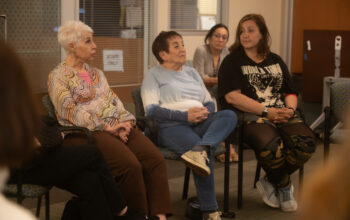Michaia Hernandez / Roundup
Even before it premiered Jan. 17 on MTV, the American adaptation of the popular British teen drama “Skins” has been—for good reason and much to nobody’s surprise—generating buzz.
After all, if the remake is even half as risqué as the original series, then American parents, who are arguably more open-minded than British parents, should be concerned.
Though in later episodes, the American version’s plot diverges from the original’s, the first episodes have similar story lines. The series revolves around a group of teenagers in Maryland as they deal with controversial issues such as substance abuse, homosexuality, broken families, mental disorders and sex.
I admit, my initial reaction after watching the pilot episode was one that echoed most first-time viewers, shock. It surprised me how blatantly the show depicted the aforementioned subject matter.
It wasn’t until I got over the disbelief that I began seeing the show in a different light. I realized that I actually liked it. Compared to most teen dramas of today, “Skins” has heart, and a purpose. I might even go as far as to say that it is beneficial to today’s youth.
“Skins” was created primarily to portray what today’s young people are dealing with, and how they cope with real-life situations. “It tries to tell the truth,” said Bryan Elsley, one of the creators of Skins, in a statement he released to MTV News.
In today’s society, it is not prudent to practice naivety. Teenagers should, at a young age, be aware of what “reality” really looks like, regardless of how less-than-perfect it might be. It is in this way that, according to freshman Erika Inza Cruz, “Skins” proved to be an “eye-opener.”
It’s easy to miss the entire point of “Skins,” because of the scandalous subjects explored by the show. Sure, the drama is known for its blatant examination of sensitive material, but that’s not what the show is about. It’s about something much more than that; it’s about the value of friendship, above everything else.
Take, for instance, the pilot episode: at some point, one of the girls overdoses on drugs at a party. Instead of leaving her to be taken care of by someone else, her friends, fully aware of the implications it would have on them if they are reported to authorities, drive her to the hospital.
“Teenagers can relate to the show,” said Pierce College freshman Robin de la Rosa. The connection that this show has with today’s young people is its level of genuineness. “Skins” doesn’t promote; rather, it educates.
The show doesn’t present the issues it touches upon in such a way that encourages emulation from teens. It actually does the opposite through the continual acknowledgement of the main characters’ bad decisions’ inevitable consequences.
One of the biggest concerns parents have on “Skins” is how easily accessible it is to children that are simply too young to be exposed to the subject matter that the show covers. Though the show airs late at night, anybody who knows how to lie about their birthday is able to see the show online.
There is unfortunately very little to be done in order to resolve this issue. Most everything is within reach for anybody, because of the growing advancement in technology.
In my opinion, the only way to combat this is for parents to be more open with their children in discussing these issues. Kids will eventually find themselves exposed to the very elements of life that parents attempt to protect them from.
Another concern voiced by the general public is the fact that most of the actors in the show are underage. It seems inappropriate to expose young teenagers to the kind of mature content that the show is known for.
Elsley is adamant that the creative forces behind the show are careful with this issue. “We’ve created a supportive and protective environment for everyone working on the show.”
—
mhernandez.roundupnews@gmail.com



